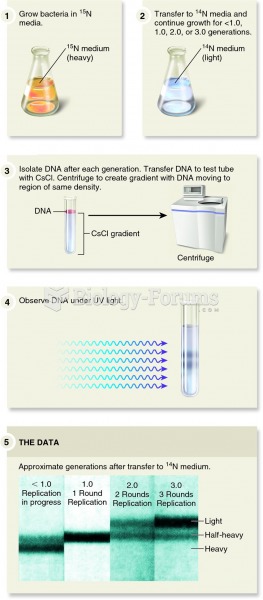|
|
|
Although not all of the following muscle groups are commonly used, intramuscular injections may be given into the abdominals, biceps, calves, deltoids, gluteals, laterals, pectorals, quadriceps, trapezoids, and triceps.
The largest baby ever born weighed more than 23 pounds but died just 11 hours after his birth in 1879. The largest surviving baby was born in October 2009 in Sumatra, Indonesia, and weighed an astounding 19.2 pounds at birth.
Urine turns bright yellow if larger than normal amounts of certain substances are consumed; one of these substances is asparagus.
Illicit drug use costs the United States approximately $181 billion every year.
People about to have surgery must tell their health care providers about all supplements they take.







